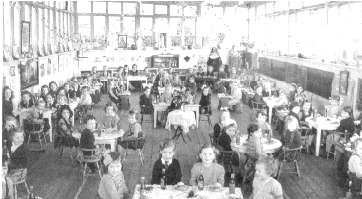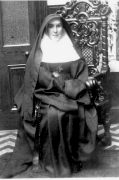
Early Montessori pupils in Waterford
Courtesy Sisters of Mercy, Waterford
In the early twentieth century Maria Montessori began a worldwide revolution when she devised a new way of educating young children in Italy. Instead of thinking in terms of subjects and the curriculum, Maria believed (from her own observation) that young children were highly motivated towards their own development.
She therefore invented equipment which had a special educational purpose, and suitable activities for each stage of that development. Children were free to choose their own activities. All the teacher had to do was to show the activities and observe the children. There were no set lessons as such, no set timetables, and especially no sitting down all day. Instead of children sitting behind their desks 'like butterflies transfixed with a pin', Maria introduced small comfortable tables and chairs and low windows to allow them see the world outside.
 Early Montessori pupils in Waterford Courtesy Sisters of Mercy, Waterford |
| This new system was introduced into Ireland in 1920 by Mother de Sales Lowry who managed, with very little financial support, to start a full Montessori programme in the Junior Section of St. Otteran's School, Philip Street, Waterford. This was the only Montessori school founded under the Department of Education, and, most unusually, was available free to the children of the area. Among the famous people who visited this school were W.B. Yeats (1926) and Dr. Maria Montessori herself a year later. |  Mother de Sales Lowry Courtesy Sisters of Mercy, Waterford |
|
Apart from this brave endeavour and that of Nancy Jordan (1908-78) who used this system for hospitalized and emotionally disturbed children, the Montessori method was slow to take off in Ireland and made little impact on elementary education until the 1960s and 1970s. Training colleges were founded in Ireland for students wishing to learn the Montessori method of education. |
 Maria Montessori was commemorated on an Italian banknote. |